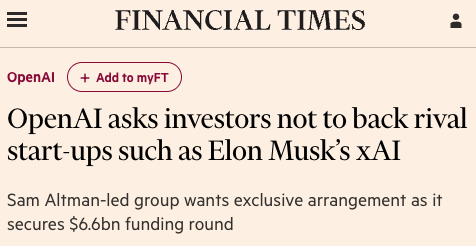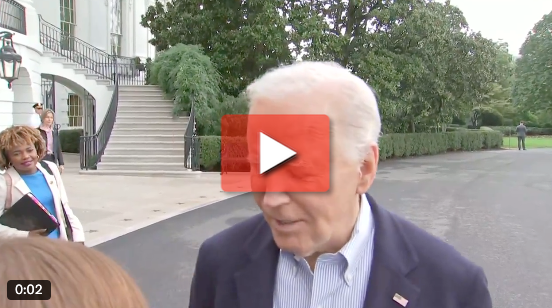What Is Sam Altman Afraid Of?
![]() What Is Sam Altman Afraid Of?
What Is Sam Altman Afraid Of?
 Sam Altman’s OpenAI needs another round of funding. This time, the pitch he’s making to prospective investors comes with major strings attached.
Sam Altman’s OpenAI needs another round of funding. This time, the pitch he’s making to prospective investors comes with major strings attached.

“OpenAI has asked investors to avoid backing rival start-ups such as Anthropic and Elon Musk’s xAI,” reports the Financial Times — “as it secures $6.6 billion in new funding and seeks to shut out challengers to its early lead in generative artificial intelligence.”
No, this is not standard operating procedure. As the FT explains…
Venture firms are party to sensitive information about the companies they invest in, and close relationships with one company can make it difficult or contentious to also back a rival.
But exclusivity is rarely insisted on, according to VCs, and many leading firms have spread their bets in certain sectors. Sequoia Capital and Andreessen Horowitz, for instance, have backed multiple AI start-ups, including both OpenAI and xAI. [Emphasis ours]
The FT’s spin is that OpenAI can get away with its demands “because investors believe the company could dominate the next wave of AI innovation, which they argue will be as significant a shift in consumer behavior as the internet or mobile.”
 That’s one possible interpretation. Another is that Altman is using what little leverage he’s got with investors before it slips away forever.
That’s one possible interpretation. Another is that Altman is using what little leverage he’s got with investors before it slips away forever.
If you follow the fates and fortunes of the AI biz, you’re probably aware that OpenAI has had no shortage of drama in recent months.
Of course, there was the bizarre boardroom coup late last year — in which Altman was briefly removed and then reinstated. But this year has seen several of Altman’s top lieutenants bolt — including chief technology officer Mira Murati just last week.
Too, there’s Altman’s desire to transition OpenAI from a nonprofit to a for-profit model.
It’s those plans that prompted Elon Musk — a co-founder of OpenAI back in 2015 — to sue OpenAI two months ago. Musk says Altman has committed a “deceit of Shakespearean proportions.”
But never mind the petty personal dramas — which by themselves would be enough to give prospective investors pause.
What’s really got Altman’s boxers in a wad is the revelation Musk is about to unleash six days from now at Tesla’s investor day event. Its title is a nod to the science-fiction legend Isaac Asimov’s collection of short stories called I, Robot.

As we said yesterday, Musk is promising, “This will be one for the history books” when he takes the stage in Burbank, California next Thursday.
And it’s the considered opinion of my senior Paradigm Press colleagues that Musk is not blowing smoke.

(Yeah, I couldn’t resist.)
Here’s what my colleagues anticipate: Musk will take the wraps off an entirely new kind of AI. Something none of us has seen before. The most powerful AI ever. A breakthrough on par with the web 30 years ago.
And, by implication, something that will erase all of Sam Altman’s advantages in the realm of generative AI. (It might even render the term “generative AI” obsolete.)
![]() Jobs: Good News Is Bad News
Jobs: Good News Is Bad News
 The stock market reaction to a blowout jobs report is… tepid.
The stock market reaction to a blowout jobs report is… tepid.
It being the first Friday of October, the government is regaling us with the September job numbers. The wonks at the Bureau of Labor Statistics conjured 254,000 new jobs for the month — way more than any Wall Street economist was expecting. The three-month average works out to a healthy 186,000 — adequate to keep up with population growth.
And unlike in recent months, there’s no divergence between the “establishment” survey of business owners — the number the media usually touts — and the “household” survey.
If anything, the household survey suggests an even more robust labor market — job gains totaling 698,000.
The official unemployment rate ticked down to 4.1%.
 The major U.S. stock indexes popped in reaction to the job numbers… only to give most of it back as the morning wore on.
The major U.S. stock indexes popped in reaction to the job numbers… only to give most of it back as the morning wore on.
At last check, the S&P 500 has inched up less than a tenth of a percent, back above 5,700. If that number holds, it won’t surpass last Friday’s record weekly close.
The muted reaction makes sense, in its own twisted good-news-is-bad-news way: If the labor market is no longer cooling off, there’s a risk the inflation rate might start moving higher. If inflation starts taking off again, that throws a wrench in the Federal Reserve’s plans to keep lowering interest rates and funneling more easy money toward Wall Street.
Thus, the betting in the futures market assesses 95% odds that the Fed will cut its benchmark fed funds rate only a quarter-percentage point next month — not the half point that Wall Street would prefer.
There’s not much movement to report in the precious metals either: Gold sits at $2,655 while silver is a tantalizing nickel away from $32. In the crypto space, Bitcoin is likewise quiet at just over $61,000.
 One uncertainty hanging over the markets this week is now resolved: As you’re likely aware, the dockworker strike is over less than 72 hours after it began.
One uncertainty hanging over the markets this week is now resolved: As you’re likely aware, the dockworker strike is over less than 72 hours after it began.
Technically the strike is suspended until Jan. 15; the two sides came to an agreement on pay while they’ll continue to hammer out everything else, especially automation.
Exactly why the voluble union boss Harold Daggett was so quick to back off his maximalist demands, he’s not saying.
As for the other big uncertainty hanging over markets this week, read on…
![]() “I Think That Would Be a Little…”
“I Think That Would Be a Little…”
 Update: The price of oil did not leap to $73.71 yesterday because Washington and Tel Aviv are collaborating on potential attacks targeting Iranian oil facilities.
Update: The price of oil did not leap to $73.71 yesterday because Washington and Tel Aviv are collaborating on potential attacks targeting Iranian oil facilities.
No, the reason oil leapt to $73.71 yesterday was that Joe Biden, asked about the subject, spat out gibberish — reminding everyone that a dementia patient is still in charge of the “rules-based international order” for the next 3½ months.
What he mumbled was impossible to capture in print. Here’s how the Financial Times tried:
Asked whether the U.S. would support Israel striking Iran’s oil facilities, Biden said: “We’re in discussion of that,” although in his truncated comment the U.S. president went on to say: “I think that would be a little... anyway.”
And The Wall Street Journal:
Asked if he would support Israel attacking Iran’s oil facilities, Biden replied, “We’re discussing that,” before adding, “I think that would be a little…” and trailing off.
Here’s the video. You try making heads or tails of it…

Combine a president incapable of spitting out a coherent thought on a critical matter of war and peace… and a media that’s too incompetent to press him with a follow-up question… and you get a dramatic spike in the oil price.
And that spike is holding today, a barrel of West Texas Intermediate up to $74.42. For perspective, it was well under $67 on Tuesday before the latest round of escalations in the Middle East.
This much is certain, as the independent journalist Max Blumenthal tweets: “Biden has been threatening to blow up the energy infrastructure of Official Enemies since just before the Nord Stream attacks.”
Of course, even addressing these market-moving mumblings opens me up to accusations of “bias for Trump” — about which more in today’s mailbag.
![]() Texas Tells Big Tech “You’re On Your Own” for Electricity
Texas Tells Big Tech “You’re On Your Own” for Electricity
 The following is one of our periodic reminders that AI threatens to collapse an already-fragile power grid.
The following is one of our periodic reminders that AI threatens to collapse an already-fragile power grid.
The head of the utility regulator in Texas is putting Big Tech on notice: Don’t expect to build new data centers near existing power plants in the Lone Star State.
Yesterday, Texas Public Utility Commission chair Thomas Gleeson attended a conference of the Gulf Coast Power Association. According to Bloomberg, “AI dominated the discussion.”
On the sidelines of that discussion, Gleeson said if data centers are built near existing power plants, it would threaten the integrity of the whole system. Big Tech will have to build its own power plants instead — at least for the next 12–15 months.
“We can’t afford to lose any of our resources off the system at this point, especially given those load-growth projections,” Gleeson told Bloomberg.
In other words, Amazon won’t be able to strike the kind of deal it did in Pennsylvania — getting exclusive access to the Susquehanna nuclear power plant. Or the kind Microsoft also got in Pennsylvania, in which the undamaged reactor at Three Mile Island will be reopened.
If you’re not yet up to speed on the fragility of the power grid and the prodigious new demands that AI will place on it… our most recent in-depth treatment was in July.
![]() Politics, Again…
Politics, Again…
 Politics is rearing its ugly head in the mailbag again. I suppose it’s inevitable — even after something as relatively anodyne as yesterday’s edition.
Politics is rearing its ugly head in the mailbag again. I suppose it’s inevitable — even after something as relatively anodyne as yesterday’s edition.
Under the subject line “Bias for Trump,” one reader wrote: “I like the market news and stock info. I don't come for the politics. Please tone down on the ungrounded political commentary. Thanks!”
[I do appreciate the friendly exclamation point…]
But someone else — perhaps in response to yesterday’s mailbag section? — wasn’t so sure about the “bias.” As he wrote, “Hmmm… Don’t you prefer Trump over Harris…?”
 And then there was one of our regulars, who it’s fair to say leans left…
And then there was one of our regulars, who it’s fair to say leans left…
“Quite surprised you published the quote from Ryan Grim, who I do not know. He is either a simpleton, or a writer with a distinct political agenda. To break down the Middle East conflict and the U.S. role in it into only two distinct possibilities is pure deception. Even more perplexing is the reason that you published it without question. Your political agenda to knock down the Biden/Harris administration, truth be damned, is not lost on your readership. We are not all quite as dumb as you think we are.
“I suppose this might be the time to ask you the defining question that J.D. Vance had such a difficult time with. Did Donald Trump lose the 2020 election, yes or no? If you answer that you are looking to the future, we know where you stand. At the risk of upsetting a large conservative portion of your readership, I dare you to answer with a yes or no, no qualifiers! Good luck.
“Don't fret too much, however: Many of us enjoy the newsletter enough regardless that we are willing to overlook any political opinions, so perhaps others will feel the same and stay with you.”
 This is the problem I’ve faced all year: I say something critical about one candidate, and people jump to the conclusion I’m in the tank for the other. Such is the present polarized atmosphere.
This is the problem I’ve faced all year: I say something critical about one candidate, and people jump to the conclusion I’m in the tank for the other. Such is the present polarized atmosphere.
The problem is made worse by the fact that Trump is not currently exercising power and Joe Biden is. Biden (or unknown others acting in his name) issues market-moving and world-changing orders; it’s inevitable I’d subject him to more scrutiny at this time.
With that precis, let’s take the third reader’s concerns item by item.
First, Ryan Grim is one of the most vital independent journalists on the scene today. He recently co-founded Drop Site News after spending seven years at The Intercept and eight years before that at HuffPost. (Not exactly right-wing outlets, either of those…)
To be clear, I have less than zero confidence that Trump can “manage” U.S. affairs in the Middle East any better than Biden/Harris. If anything, he’s even more likely to gin up a disastrous war in the region to placate his most important donor (Miriam Adelson, widow of the pro-Israel casino magnate Sheldon Adelson) and his base of end-times evangelicals who think U.S. foreign policy should be an instrument to hasten the return of Jesus.
The 2020 election? To the extent I’ve looked into it, I’m not persuaded Trump won — and I mocked the more ludicrous claims of Sidney Powell et al. in real-time (here and here). At the same time, it’s risible to suggest that what happened on Jan. 6, 2021 was an “insurrection.”
Of course, that’s a position that pleases no one on either side of the divide. But reality doesn’t care about your tribal loyalties.
In any event, I thank the third reader for his polite engagement and continued readership. As always, we have only two aims here each day — 1) that you learn at least one interesting thing you didn’t know before and 2) that you decide to come back the next day.
At least for this one critic, it seems we succeed?










